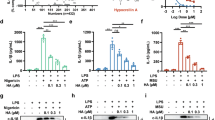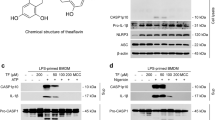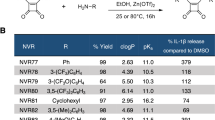Abstract
Background
The treatment of nucleotide-binding domain and leucine-rich repeat containing family, pyrin domain containing 3 (NLRP3) inflammasome-mediated pediatric inflammatory diseases is challenging. Here we studied whether cyclic adenosine monophosphate (cAMP) elevator forskolin could attenuate the nigericin-induced NLRP3-inflammasome activation and interleukin-1β (IL-1β) secretion in human macrophages.
Methods
The proteins and messenger RNA (mRNA) levels of inflammasome structural proteins and proinflammatory cytokines were measured in forskolin-stimulated nigericin-activated human THP-1 macrophages and primary macrophages.
Results
Activation of THP-1 macrophages with nigericin increased the mRNA expression of NLRP3, IL-1β, and caspase-1 (P < 0.01). Forskolin stimulation had no effect on the mRNA expression of NLRP3, caspase-1, or IL-1β in nigericin-activated cells (P > 0.05), while their protein levels were significantly decreased (P < 0.05). Forskolin-mediated increase in cytoplasmic cAMP in non-activated cells was attenuated in nigericin-activated macrophages (P < 0.05). Basal IL-1β secretion increased from 584 to 2696 pg/mL (P < 0.01) in nigericin-activated macrophages; forskolin dose-dependently reduced the nigericin-induced secretion of mature IL-1β (P < 0.01). Forskolin also inhibited the IL-1β secretion from activated human primary macrophages.
Conclusions
Forskolin inhibits the NLRP3 inflammasome activation and the secretion of mature IL-1β, in human macrophages. Forskolin and other cAMP elevator drugs could represent a novel approach for treatment of diseases associated with excessive inflammasome activation, like pediatric inflammatory diseases.
Similar content being viewed by others
Log in or create a free account to read this content
Gain free access to this article, as well as selected content from this journal and more on nature.com
or
References
Scott, H. F. et al. The prevalence and diagnostic utility of systemic inflammatory response syndrome vital signs in a pediatric emergency department. Acad. Emerg. Med. 22, 381–389 (2015).
Pfalzgraff, A. & Weindl, G. Intracellular lipopolysaccharide sensing as a potential therapeutic target for sepsis. Trends Pharm. Sci. 40, 187–197 (2019).
Malmo, J. et al. Cytokine profiles in human metapneumovirus infected children: identification of genes involved in the antiviral response and pathogenesis. PLoS ONE 11, e0155484 (2016).
Li, D. et al. Regulation of the NLRP3 inflammasome and macrophage pyroptosis by the p38 MAPK signaling pathway in a mouse model of acute lung injury. Mol. Med. Rep. 18, 4399–4409 (2018).
Elliott, E. I. & Sutterwala, F. S. Initiation and perpetuation of NLRP3 inflammasome activation and assembly. Immunol. Rev. 265, 35–52 (2015).
Guo, H. T., Callaway, J. B. & Ting, J. P. Inflammasomes: mechanism of action, role in disease, and therapeutics. Nat. Med. 21, 677–687 (2015).
Cuenca, A. G. et al. Role of innate immunity in neonatal infection. Am. J. Perinatol. 30, 105–112 (2013).
Man, S. M. & Kanneganti, T. D. Regulation of inflammasome activation. Immunol. Rev. 265, 6–21 (2015).
Shenker, B. J. et al. Aggregatibacter actinomycetemcomitans cytolethal distending toxin activates the NLRP3 inflammasome in human macrophages, leading to the release of proinflammatory. Infect. Immun. 83, 1487–1496 (2015).
Jo, E. K. et al. Molecular mechanisms regulating NLRP3 inflammasome activation. Cell. Mol. Immunol. 13, 148–159 (2016).
Daems, C. et al. MEF2 cooperates with forskolin/cAMP and GATA4 to regulate star gene expression in mouse MA-10 leydig cells. Endocrinology 156, 2693–2703 (2015).
Du, X. et al. Isoforskolin and forskolin attenuate lipopolysaccharide-induced inflammation through TLR4/MyD88/NF-κB cascades in human mononuclear leukocytes. Phytother. Res. 33, 602–609 (2019).
Yan, Y. et al. Dopamine controls systemic inflammation through inhibition of NLRP3 inflammasome. Cell 160, 62–73 (2015).
Sokolowska, M. et al. Prostaglandin E2 inhibits NLRP3 inflammasome activation through EP4 receptor and intracellular cyclic AMP in human macrophages. J. Immunol. 194, 5472–5487 (2015).
Yeo, C. et al. Ficoll-Paque versus Lymphoprep: a comparative study of two density gradient media for therapeutic bone marrow mononuclear cell preparations. Regen. Med. 4, 689–696 (2009).
Torre-Minguela, C., Mesa Del Castillo, P. & Pelegrín, P. The NLRP3 and Pyrin inflammasomes: implications in the pathophysiology of autoinflammatory diseases. Front. Immunol. 8, 43 (2017).
Mangan, M. S. J. et al. Targeting the NLRP3 inflammasome in inflammatory diseases. Nat. Rev. Drug Discov. 17, 688 (2018).
Perregaux, D. & Gabel, C. A. Interleukin-1 beta maturation and release in response to ATP and nigericin. Evidence that potassium depletion mediated by these agents is a necessary and common feature of their activity. J. Biol. Chem. 269, 15195–15203 (1994).
Pelegrin, P. & Surprenant, A. Pannexin-1 couples to maitotoxin- and nigericin- induced interleukin-1beta release through a dye uptake-independent pathway. J. Biol. Chem. 282, 2386–2394 (2007).
Mortimer, L. et al. NLRP3 inflammasome inhibition is disrupted in a group of auto-inflammatory disease CAPS mutations. Nat. Immunol. 17, 1176–1186 (2016).
Zasłona, Z. et al. The induction of pro-IL-1β by lipopolysaccharide requires endogenous prostaglandin E2 production. J. Immunol. 198, 3558–3564 (2017).
Bauernfeind, F. G. et al. Cutting edge: NF-kappaB activating pattern recognition and cytokine receptors license NLRP3 inflammasome activation by regulating NLRP3 expression. J. Immunol. 183, 787–791 (2009).
Acknowledgements
We thank Xiaoping Shang at the Medical Records Department for the statistical assistance. This work was supported by the National Natural Science Foundation of China (81500588) and an independent research grant from the Finnish Cultural Foundation (00130167). The funders had no role in study design, data collection, and analysis, decision to publish, or preparation of the manuscript.
Author information
Authors and Affiliations
Contributions
Y.C. got the financial supports from the Foundations, conceived and designed the experiments, performed the experiments, analyzed the data, wrote the paper, prepared figures, reviewed drafts of the paper, redid the experiments, and revised the paper. J.G.W. performed the experiments, analyzed the data, wrote the paper, reviewed drafts of the paper, and revised the paper. J.J.F. performed the experiments, analyzed the data, prepared figures, reviewed drafts of the paper, and revised the paper. Y.H.W. performed the experiments, reviewed drafts of the paper, and revised the paper. T.F.L. contributed reagents and some materials, reviewed the draft of the paper, and revised the paper. K.N. contributed analysis protocols, helped to design the experiments, reviewed the manuscript, and revised the paper. K.K.E. contributed reagents, helped to design the experiments, reviewed the manuscript, and revised the paper. D.X. helped redo some experiments and reviewed the revised paper.
Corresponding author
Ethics declarations
Competing interests
The authors declare no competing interests.
Additional information
Publisher’s note: Springer Nature remains neutral with regard to jurisdictional claims in published maps and institutional affiliations.
Rights and permissions
About this article
Cite this article
Chen, Y., Wen, J., Feng, J. et al. Forskolin attenuates the NLRP3 inflammasome activation and IL-1β secretion in human macrophages. Pediatr Res 86, 692–698 (2019). https://doi.org/10.1038/s41390-019-0418-4
Received:
Revised:
Accepted:
Published:
Version of record:
Issue date:
DOI: https://doi.org/10.1038/s41390-019-0418-4
This article is cited by
-
Pro-inflammatory response of human iPSC-derived intestinal epithelial monolayers towards microbial toxins LPS and nigericin
Archives of Toxicology (2026)
-
Forskolin treatment enhances muscle regeneration and shows therapeutic potential with limitations in Duchenne muscular dystrophy
Skeletal Muscle (2025)
-
Erythropoietin prevented the decreased expression of aquaporin1–3 in ureteral obstructive kidneys in juvenile rats
Pediatric Research (2023)
-
Butyrate in combination with forskolin alleviates necrotic enteritis, increases feed efficiency, and improves carcass composition of broilers
Journal of Animal Science and Biotechnology (2022)
-
Insights image for Forskolin attenuates the NLRP3 inflammasome activation and IL-1β secretion in human macrophages
Pediatric Research (2019)



